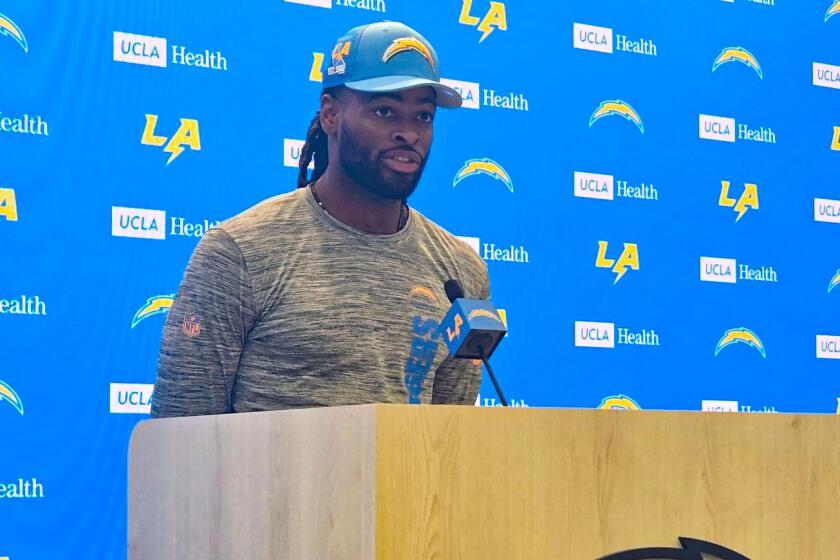Football Great Walter Payton Dies at 45
- Share via
Walter Payton, the National Football League’s all-time leading rusher and a man who earned the nickname “Sweetness” for both his disposition and his uncanny ability to elude tacklers, died Monday of complications of a rare liver disease. He was 45.
Diagnosed with primary sclerosing cholangitis, a condition in which the bile ducts of the liver become blocked, Payton was recently removed from a transplant waiting list after doctors found that cancer had spread throughout his body.
The former Chicago Bears star died among family at his home in suburban Chicago.
“He had more heart than anyone else who played the game,” said Jim Brown, a fellow Hall of Fame running back. “He took on bigger guys. He fought for every inch. He was a true champion, and I don’t say that about too many players.”
Not as bullish as Brown or as dazzling as Barry Sanders, Payton combined determination with an array of physical skills, with quickness and balance and bruising durability.
That stamina translated into a record 3,838 carries during a 13-year career in which he missed only a few games. All those carries yielded 16,726 yards, almost 1,500 yards more than the nearest competitor, Sanders, who retired before this season.
Payton holds seven league records, among them most yards in a game (275) and most games with 100 or more yards rushing (77). He was selected for the Pro Bowl nine times and voted into the Hall of Fame in 1993, the first year he was eligible.
“He was without a doubt one of the greatest players in the history of the sport,” NFL Commissioner Paul Tagliabue said. “Walter exemplified class, and all of us in sports should honor him by striving to perpetuate his standard of excellence.”
Mysterious Disease Dimmed His Smile
Payton confirmed in February that he was suffering from the liver disease and his name was put on a transplant waiting list at the Mayo Clinic.
The mysterious disease scars the bile ducts, which carry bile from the liver to the small intestine to help digest food. When the ducts become blocked, bile backs up and migrates elsewhere. The body’s immune system mistakenly attacks its own tissues.
“That’s not like me,” a shaken Payton told People magazine after confirming his diagnosis. “Everything works perfect.”
With each subsequent public appearance, the former athlete looked more gaunt and jaundiced. Some of the luster was missing from his trademark smile, his familiar high-pitched voice and the cheeriness that was partly responsible for his nickname.
Further testing revealed an additional problem: a tumor in his liver.
“Because of the aggressive nature of his cancer, Walter’s malignancy spread outside of his liver,” Dr. Greg Gores, his Mayo Clinic physician, said at a news conference Monday. “Transplant was no longer an option.”
Radiation and chemotherapy were unsuccessful, said Gores, who praised Payton for “the dignity and courage he showed during this long and severe illness.”
Rumors that Payton’s health was rapidly deteriorating began circulating last week when his son, Jarrett, left the University of Miami football team to return home. Jarrett said his father was surrounded by family, friends and former teammates in recent days.
One of those teammates, Mike Singletary, read Scripture and prayed with Payton until hours before his death.
“His attitude for life . . . you wanted to be around him because . . . if you were down, he would not let you stay down,” Singletary said at a news conference. “When I left him [Monday] morning, I remember going back home and telling my wife there was a peace. There was definitely a peace there I had not seen.
“What I experienced this weekend was by far the best I’ve seen of him,” Singletary added.
Walter Jerry Payton was born July 25, 1954, in Columbia, Miss., the son of strict Baptists. His father, the late Peter Payton, was a factory worker.
As a child, Payton was more interested in music than sports. He played drums in the Columbia High School marching band, watching from the bleachers while his older brother, Eddie, a future Minnesota Vikings kick returner, starred at halfback.
After Eddie graduated, the football coach persuaded Walter to try out for the team. The first time Payton carried the ball in a high school game, he ran 60 yards for a touchdown.
In typically humorous and self-deprecating fashion, he later credited his siblings with preparing him for football.
“That’s the reason I had the moves I did,” Payton said during his Hall of Fame induction speech. “When you have an angry sister and angry brother chasing you with a broom and a wet dishrag, you tend to pick up moves you never had before.”
The 5-foot-10, 205-pound back developed a distinctive style--the churning legs and punishing stiff arm, the knack for bouncing off tacklers. He drew national attention as a star at tiny Jackson State, where he set an NCAA record for points scored.
“It was as if God said, ‘Let there be a running back,’ and he gave us Walter Payton,” said Jackie Slater, a college teammate who later played 20 years for the Rams. “The zest, passion and work ethic he had for the game of football was second to none.”
A Rocky Start to a Stellar Career
A first-round draft pick, Payton negotiated a then-unprecedented $126,000 signing bonus and was heralded as a savior for the struggling Bears. But appearances were deceiving.
“Walter came here as a frightened kid,” said the late Jim Finks, former Bears general manager. “He was in a large, large city with tremendous media attention, and he had signed a contract that was for money beyond his wildest dreams.”
In those early days, Finks said, “he had a hard time relaxing.”
That rookie season, Payton struggled with an ankle injury and played sporadically, gaining 679 yards. It wasn’t until 1977 that he established himself as a star, rushing for 1,852 yards and earning the league’s most valuable player award while leading the Bears to their first winning season in a decade.
“On the football field, you wanted to be just like he was,” Eric Dickerson, a fellow Hall of Fame running back, told ESPN. “He was an icon. To watch him play and to know him and what kind of individual he was, it was phenomenal.”
Yet, for all the records Payton set and all the yards he gained running and catching the ball--he amassed more than 4,500 yards receiving--Chicago struggled through mediocre seasons.
It took the arrival of Coach Mike Ditka, a former Bear player, and the development of a ferocious defense to transform the Bears into a contender and give an aging Payton the one victory he had yet to attain: a Super Bowl title, after the 1985 season.
Perhaps the only thing that meant more to him was passing Brown as the game’s all-time rusher. The night in 1984 that Payton set the record, the normally reclusive Brown congratulated him on television.
“We were like two individuals who understood we were warriors,” Brown said. “I felt very comfortable with him because I knew of his pureness and I wanted to acknowledge his greatness.”
Payton wanted to go further.
“I want to set the record so high that the next person who tries for it, it’s going to bust his heart,” he said.
By the time he left the game in 1987, Payton had added 4,000 yards to his total.
Retirement brought a whole new set of goals. Displaying the same enthusiasm with which he once burst across the goal line, Payton involved himself in designing golf courses, in a concession business at a Chicago airport, in a nightclub and travel agencies and nursing homes and real estate ventures. He gave motivational talks, was part of a group trying to land an NFL expansion team, and became co-owner of a car racing team.
As always, the man known as “Sweetness” maintained his sunny disposition, even after illness took hold.
“I will always remember his smile,” Singletary said. “He loved to laugh. Loved to have fun. You couldn’t believe a guy who was as great as he was . . . wouldn’t take himself seriously.”
Times staff writer Larry Stewart contributed to this story.
* REMEMBERING THE MAN
Payton’s actions spoke volumes, writes Bill Plaschke. D1
* A TRUE FOOT SOLDIER
Payton leaves fond memories, Randy Harvey writes. D1
More to Read
Go beyond the scoreboard
Get the latest on L.A.'s teams in the daily Sports Report newsletter.
You may occasionally receive promotional content from the Los Angeles Times.











